
When someone is diagnosed with cancer, one of the first things they hear is the word chemotherapy. It’s not just a treatment-it’s a powerful, complex system of drugs designed to attack fast-growing cancer cells. But here’s the thing: chemotherapy doesn’t just affect cancer. It hits healthy cells too. And when you’re already on other medications-for high blood pressure, diabetes, depression, or even over-the-counter painkillers-things can get dangerous fast.
How Chemotherapy Works (And Why It’s So Harsh)
Chemotherapy drugs are built to kill cells that divide quickly. That’s why they work well against cancers like leukemia, lymphoma, and breast cancer. But they also target hair follicles, the lining of your gut, and bone marrow-places where cells naturally renew fast. That’s where the side effects come from: hair loss, nausea, low blood counts, and fatigue. There are more than 100 different chemotherapy drugs in use today. They’re grouped by how they work. Anthracyclines like doxorubicin damage DNA directly. Alkylating agents like cyclophosphamide mess with cell replication. Antimetabolites like methotrexate trick cells into using fake building blocks, so they can’t grow. Each class has its own risks. Doxorubicin, for example, can permanently damage the heart if you get too much over your lifetime-doctors cap it at 450-550 mg/m². Most patients get combinations of these drugs, not just one. The BEP regimen for testicular cancer uses bleomycin, vinblastine, and cisplatin together. Why? Because hitting cancer from multiple angles reduces the chance it’ll learn to resist. These regimens usually run every 2-4 weeks, giving your body a chance to recover between doses.Drug Interactions: The Hidden Danger
Here’s where things get risky. Chemotherapy doesn’t live in a vacuum. It interacts with almost everything else you take. Take grapefruit juice. It’s fine for most people, but if you’re on paclitaxel or docetaxel, it can spike your drug levels dangerously high. Why? Grapefruit blocks an enzyme in your liver (CYP3A4) that normally breaks down these drugs. Same goes for St. John’s wort-a common herbal remedy for depression. It speeds up how fast your body clears out chemotherapy drugs like irinotecan, making them less effective. Even common painkillers matter. NSAIDs like ibuprofen or naproxen can increase the risk of kidney damage when combined with cisplatin. Acetaminophen (Tylenol) is safer, but it can interfere with how your liver processes certain chemo drugs, especially if you’re already taking multiple medications. Antibiotics are another big one. Some, like fluoroquinolones, can raise the risk of heart rhythm problems when paired with drugs like doxorubicin. And don’t forget antifungals. Drugs like ketoconazole can slow down the breakdown of taxanes, leading to toxic buildup. The bottom line? Never start, stop, or change any medication-prescription, OTC, or supplement-without talking to your oncology team. A pharmacist who specializes in cancer care can spot interactions most doctors miss.Who’s at Highest Risk?
Not everyone faces the same level of risk. Older adults, people with kidney or liver disease, and those taking five or more medications are at greater risk for harmful interactions. Black patients, according to a 2023 Patient Advocacy Foundation survey, experience treatment delays due to low white blood cell counts 1.7 times more often than White patients-partly because they’re more likely to be on multiple medications that interact with chemo. People on oral chemotherapy-like capecitabine or temozolomide-are especially vulnerable. These drugs are taken at home, often without direct medical supervision. Studies show 20-30% of patients miss doses or take them wrong. That’s not always due to forgetfulness. Sometimes, it’s because they’re trying to manage side effects with another drug they think is harmless-like melatonin for sleep or ginger for nausea.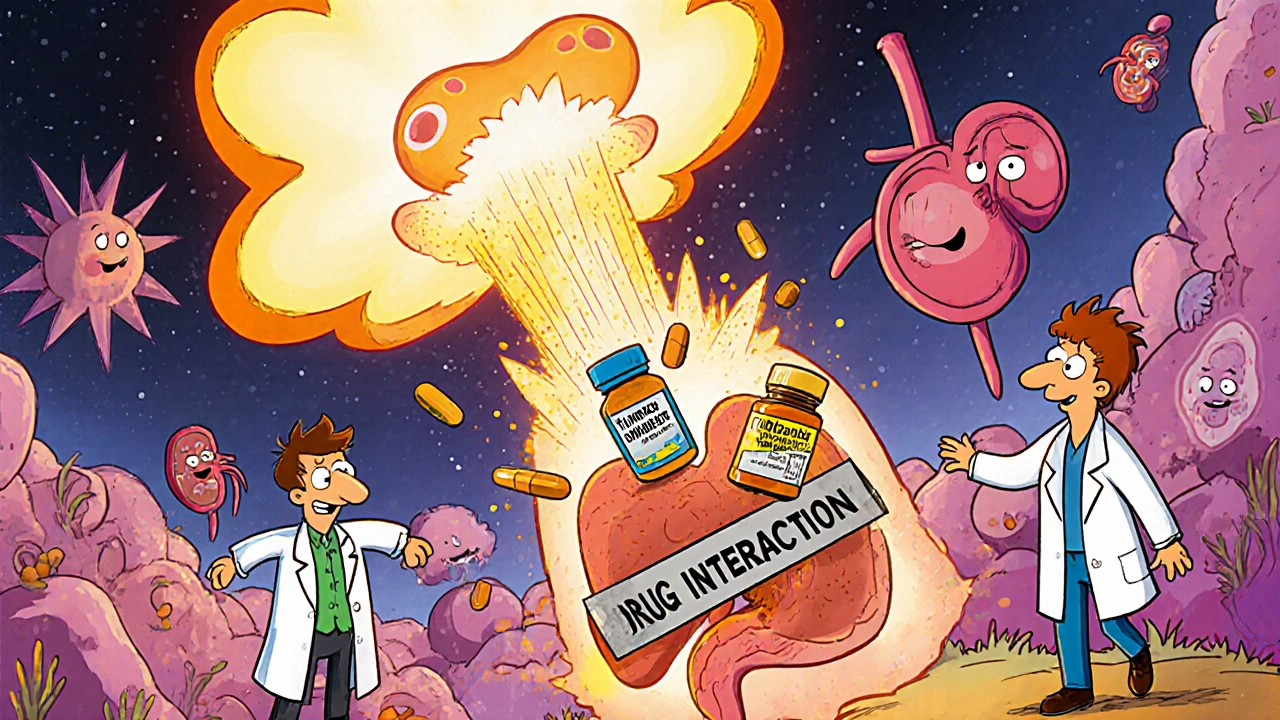
What Happens When Interactions Go Wrong?
The consequences aren’t theoretical. In 2022, a patient on irinotecan for colon cancer took a common antacid containing magnesium. The antacid reduced how well the chemo was absorbed. The tumor kept growing. By the time it was caught, the cancer had spread. Another case: a woman on doxorubicin started taking a popular herbal blend for “immune support.” One ingredient, echinacea, triggered an autoimmune reaction that damaged her heart. She ended up in the hospital with heart failure. These aren’t rare. The American Society of Health-System Pharmacists says 98% of U.S. cancer centers now use oncology pharmacists to double-check every chemo order. Why? Because 1 in 4 chemotherapy-related deaths come from complications-not the cancer itself.How to Stay Safe
Here’s what actually works:- Keep a complete, up-to-date list of everything you take-meds, vitamins, supplements, herbs, even CBD oil. Bring it to every appointment.
- Ask your oncologist: “Is this safe with my chemo?” Even if it’s something you’ve taken for years.
- Use one pharmacy for all your prescriptions. That way, the pharmacist can flag interactions across all your meds.
- If you’re on oral chemo, set phone alarms. Missing a dose can reduce effectiveness.
- Report any new symptom fast-especially fever, unusual bruising, or severe diarrhea. It could be a drug interaction.
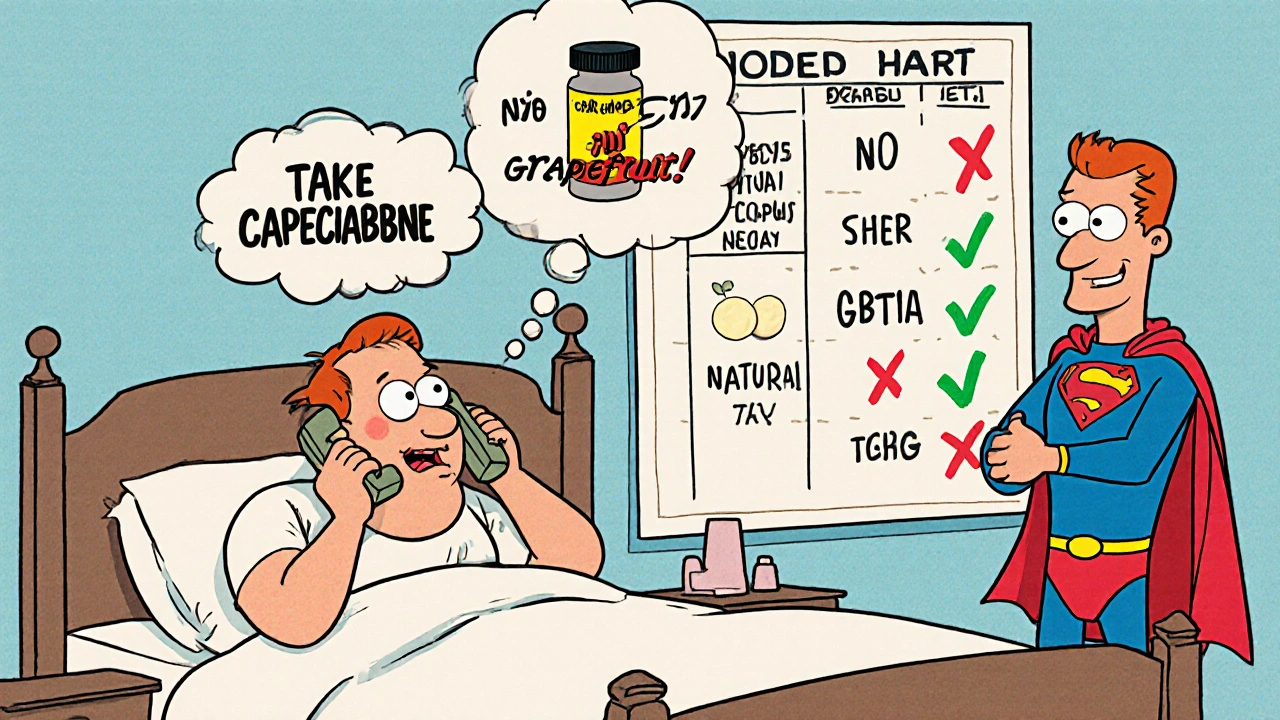
The Future: Smarter, Safer Chemo
Science is catching up. New drugs like sacituzumab govitecan (Trodelvy) deliver chemotherapy directly to cancer cells using antibodies-like a guided missile instead of a bomb. That cuts down on side effects and interactions. Genetic testing is also becoming routine. Before giving irinotecan, doctors now check for a gene variant (UGT1A1) that makes some people much more sensitive to its toxicity. Same with tamoxifen-CYP2D6 testing tells doctors if a patient will metabolize it properly. And now, doctors are using tumor DNA in the blood to decide how long chemo should last. A 2023 study showed this approach cut unnecessary treatment by 32% in colon cancer patients-without lowering survival rates.What Patients Say
People who’ve been through it don’t sugarcoat it. On cancer forums, you’ll hear: “I lost my hair, my energy, my appetite-but I’m alive because of it.” Or: “I thought the nausea would kill me. Then I found a new antiemetic, and it changed everything.” But the most common thread? “I wish I’d known more about the drugs I was taking.” One woman, SurvivorJen, posted on Reddit: “AC-T chemo nearly broke me. But I’d do it again. Just make sure your pharmacist checks every pill you take.”Bottom Line
Chemotherapy saves lives. But it’s not a magic bullet. It’s a powerful tool that demands respect-and careful management. The biggest risk isn’t always the cancer. It’s the quiet, unnoticed interaction between your chemo and that little pill you thought was harmless. Talk to your oncology team. Ask questions. Keep your medication list updated. Don’t assume anything is safe. Because in cancer care, the smallest detail can make the biggest difference.Can I take over-the-counter painkillers while on chemotherapy?
Some are safe, others aren’t. Acetaminophen (Tylenol) is usually okay for mild pain, but NSAIDs like ibuprofen or naproxen can increase kidney damage risk when combined with cisplatin or other chemo drugs. Always check with your oncology team before taking anything-even a single pill.
Do herbal supplements interfere with chemotherapy?
Yes, many do. St. John’s wort can make chemo less effective by speeding up its breakdown. Grapefruit juice can cause dangerous drug buildup. Even popular herbs like echinacea or turmeric may alter how your liver processes chemotherapy. There’s no such thing as a “natural” chemo-safe supplement. Always disclose everything you’re taking.
Why do I need an oncology pharmacist?
Oncology pharmacists specialize in cancer drugs and their interactions. They check every prescription for dangerous combos, adjust doses based on your liver/kidney function, and spot hidden risks like supplement interactions. At most major cancer centers, they’re required to review every chemo order before it’s given.
Can chemotherapy interact with my blood pressure or diabetes meds?
Absolutely. Chemo can change how your body handles other drugs. For example, some chemo drugs cause high blood pressure, which may require adjusting your antihypertensive meds. Others affect blood sugar levels, meaning insulin or oral diabetes drugs may need tweaking. Your care team should monitor these regularly.
What should I do if I miss a dose of oral chemotherapy?
Don’t double up. Call your oncology team immediately. Missing a dose can reduce effectiveness, but taking extra can cause toxicity. Each drug has specific instructions-some should be skipped, others can be taken late. Never guess. Your pharmacy or nurse can guide you.
Are newer cancer drugs safer than chemotherapy?
They’re often more targeted, which means fewer side effects in some cases. But they’re not risk-free. Targeted therapies and immunotherapies have their own unique interactions and side effects. Many patients still need chemotherapy as part of a combination plan. The goal isn’t to replace chemo entirely-it’s to use it smarter, with better support and fewer harmful overlaps.

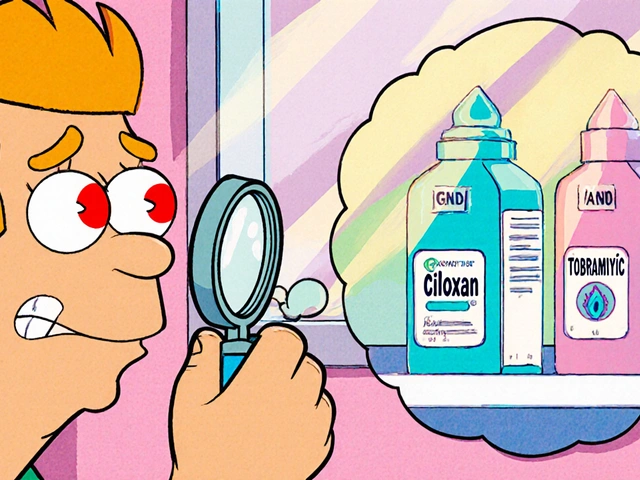
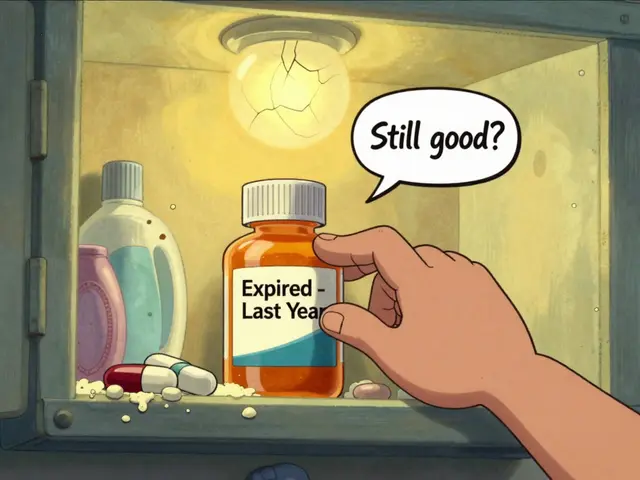
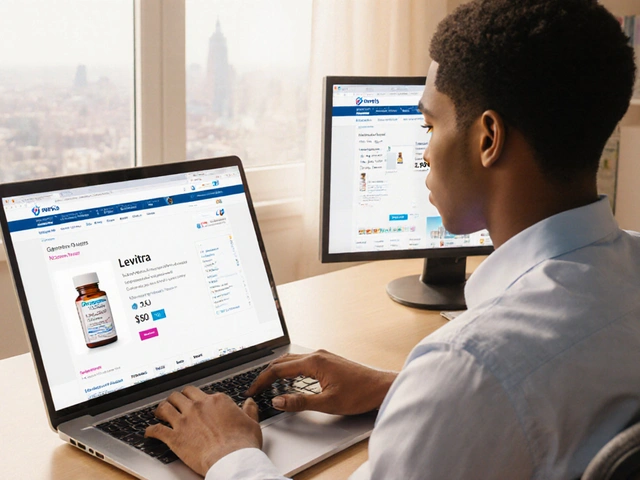
Andrew Forthmuller
November 12, 2025Just took my chemo yesterday. Tylenol only. No ibuprofen. Period.
Shante Ajadeen
November 13, 2025Thank you for this. I’ve been scared to ask my oncologist about my turmeric capsules. Now I know to bring it up. Seriously, this post saved me from accidentally sabotaging my treatment.
dace yates
November 15, 2025I read the part about UGT1A1 testing and had to look it up. I didn’t know my genetic profile could change my chemo dose. That’s wild. Why isn’t this standard everywhere? It’s not like DNA tests are expensive anymore.
Danae Miley
November 16, 2025Let’s be clear: the claim that ‘1 in 4 chemotherapy-related deaths come from complications-not the cancer itself’ is statistically misleading without context. Mortality attribution in oncology is notoriously messy. Also, ‘toxic buildup’ isn’t a medical term-it’s alarmist phrasing. This article needs a fact-checker.
Benjamin Stöffler
November 17, 2025Chemotherapy is not a ‘bomb’-it’s a pharmacological cascade governed by kinetic and dynamic principles; the metaphor is reductive and dangerous. The body is not a battlefield-it’s a homeostatic network. The notion that ‘natural’ supplements are inherently unsafe ignores the fact that most pharmaceuticals are derived from plant alkaloids. The real issue is lack of pharmacokinetic literacy among patients and providers alike. We must move beyond fear-based education toward systems-based understanding.
Moreover, the assertion that ‘no supplement is chemo-safe’ is empirically false. Curcumin modulates NF-kB pathways and may even enhance cytotoxicity in certain contexts. The problem isn’t the supplement-it’s the absence of individualized risk stratification. We treat patients as variables, not organisms.
And yes, the oncology pharmacist is indispensable. But why is their role still optional in 30% of community hospitals? That’s not negligence-it’s systemic underfunding of clinical pharmacy infrastructure. The American Society of Health-System Pharmacists has been screaming this for a decade. The system is broken, not the patient.
And for the love of all that’s rational-stop calling grapefruit juice ‘dangerous.’ It’s a CYP3A4 inhibitor. That’s biochemistry. We don’t demonize enzymes. We manage them. If you’re on paclitaxel, avoid grapefruit. If you’re on irinotecan, it’s irrelevant. Context matters. Stop oversimplifying.
The future isn’t ‘guided missiles.’ It’s precision pharmacodynamics. Liquid biopsies aren’t just for monitoring-they’re for dynamic dosing. We’re moving toward adaptive therapy, not fixed regimens. The goal isn’t to kill every cancer cell-it’s to maintain equilibrium. That’s not chemotherapy. That’s systems biology.
And yes, your mom’s echinacea? It might not kill you. But it might alter your cytokine profile enough to reduce T-cell infiltration in the tumor microenvironment. That’s not ‘immune support.’ That’s immunomodulation. And we don’t have enough data to say it’s benign.
So stop being afraid. Start being informed. And for God’s sake, stop using emoticons when discussing lethal drug interactions.
Erica Cruz
November 18, 2025Oh wow, another ‘chemo is scary but don’t panic’ article. So predictable. You know what’s scarier? The fact that this whole thing is run by corporations who profit from keeping people confused. Grapefruit juice? St. John’s wort? Please. The real villain is Big Pharma pushing expensive, interaction-heavy drugs while ignoring cheaper, safer alternatives. Why is there no research on vitamin C IVs with chemo? Oh right-can’t patent it. Wake up.
Also, ‘oncology pharmacist’ sounds like a fancy title for someone who just reads labels. My cousin’s oncologist didn’t even know her blood pressure med interacted with her chemo. The system is a joke.
Johnson Abraham
November 18, 2025lol so i took ibuprofen for my headache and now i’m gonna die? 😂
my chemo doc said tylenol is fine. grapefruit? nah. st johns wort? no way. why is everyone so scared? i’m still alive. that’s all that matters.
also why do people write like 10 paragraphs? just say the thing.
Charles Lewis
November 19, 2025It is imperative that we recognize the profound responsibility borne by both patients and providers in the context of chemotherapy administration. The complexity of polypharmacy in oncology is not merely a clinical challenge-it is a moral one. When a patient takes an over-the-counter analgesic without disclosure, they are not acting out of negligence alone; they are often operating within a healthcare system that fails to provide accessible, non-judgmental education. The burden of vigilance should not rest solely on the shoulders of the sick. We must institutionalize mandatory medication reconciliation at every point of contact-not as a checkbox, but as a sacred covenant of care. Furthermore, the marginalization of oncology pharmacists in non-academic settings represents a systemic failure of resource allocation. Their expertise is not a luxury; it is a lifeline. We must advocate for their integration into every oncology workflow, regardless of geographic or economic disparity. And to those who dismiss herbal supplements as ‘harmless’-I urge you to consider that ‘natural’ does not equate to ‘innocuous.’ The human body is not a machine that can be tuned with folk remedies; it is a fragile, evolving ecosystem. Let us honor that complexity with humility, rigor, and compassion.
Renee Ruth
November 21, 2025I knew this would happen. I told my sister not to take that ‘immune booster’ before her third round. She didn’t listen. Now she’s in the hospital with myocarditis. They said it was ‘likely’ echinacea. They didn’t even test it. Just assumed. I’m not mad. I’m just… done. This system is a graveyard of ‘I thought it was fine.’
Samantha Wade
November 22, 2025This article is essential reading. Every cancer patient, caregiver, and clinician should print it, laminate it, and post it on their fridge. The fact that 20-30% of oral chemo patients miss doses or take them incorrectly is a national scandal. We have phone alarms for coffee but not for life-saving medication? That’s not forgetfulness-that’s neglect. Oncology pharmacists should be mandatory in every clinic, not a ‘bonus.’ And if your doctor says ‘just ask’-they’re not doing their job. You need a pharmacist on your team. Period. No more ‘I thought it was safe.’ We are past the era of guesswork. The science is here. The tools are here. The will? Not yet.
Elizabeth Buján
November 23, 2025i just wanna say thank you to whoever wrote this. i’ve been on oral chemo for 8 months. i took ginger tea for nausea because my mom said it ‘helps.’ i didn’t think it mattered. now i’m terrified. but also… grateful. i called my pharmacist today and they said it’s probably fine but to stop just in case. they didn’t judge me. they just helped. that’s what this is about. not fear. not shame. just someone who cares enough to ask. please, if you’re reading this-don’t be ashamed to ask. your team wants to help. they’re just waiting for you to speak up.
vanessa k
November 24, 2025My dad passed last year from complications after chemo. He took melatonin for sleep. The oncologist never asked about supplements. We never thought to mention it. Now I know melatonin can interfere with CYP enzymes. I’m not blaming anyone. But I’m telling you: if you’re on chemo, tell everyone. Every. Single. Thing. Even if it’s ‘just’ a vitamin. Even if you think it’s stupid. It’s not stupid. It’s survival.
manish kumar
November 25, 2025As someone from India where access to oncology pharmacists is rare, I want to say this: the advice here is gold, but it’s also a luxury. In rural clinics, patients are handed chemo pills with no counseling. No pharmacist. No interaction check. We rely on community health workers who have never heard of CYP3A4. This article should be translated into Hindi, Tamil, Bengali-every language. Because the danger isn’t just in the drugs-it’s in the silence. If you’re reading this and you’re in a position to help-share it. Don’t let someone die because they didn’t know grapefruit juice could kill their treatment.
Nicole M
November 26, 2025Just got my first chemo appointment. I wrote down every pill I take-blood pressure, thyroid, even my daily omega-3. Took it to the pharmacist. She said two of them might interfere. We swapped one out. I felt like a superhero. This post? Yeah. It helped. Don’t overthink it. Just write it down. Talk to someone. That’s it.